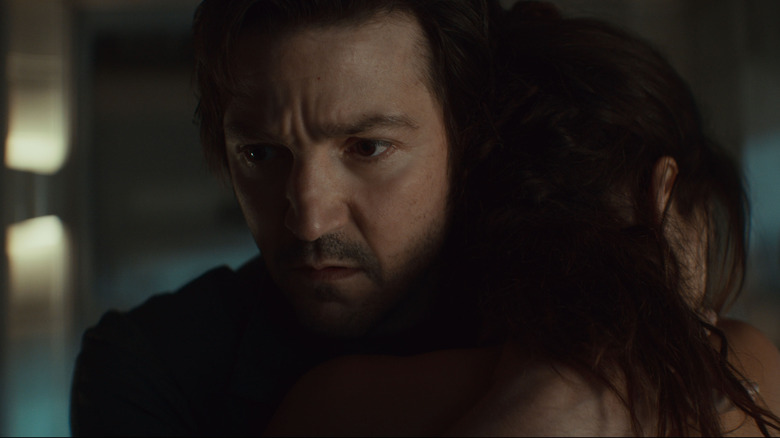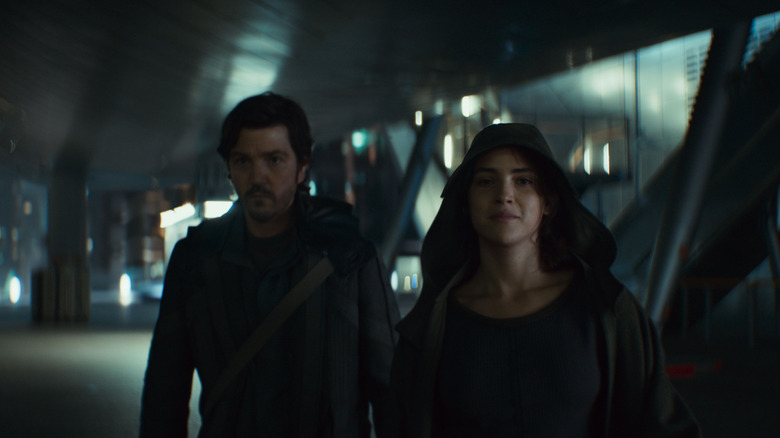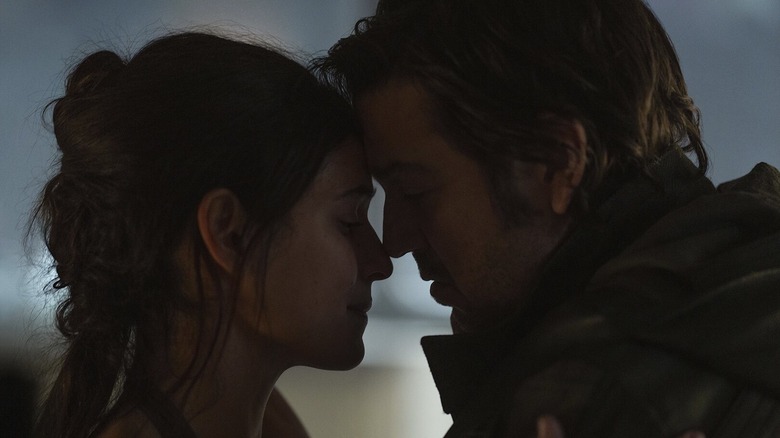Andor Season 2 Uses The Force To Explain One Major Star Wars Mystery
This post contains spoilers for "Andor."
There are a lot of differences between the burgeoning Rebellion seen throughout the earlier parts of "Andor" and the unified Rebel Alliance glimpsed at the end of 1977's "Star Wars: Episode IV — A New Hope." Lots of that comes down to size, organization, and military might — topics that "Andor" spends a great deal of time exploring. But there's another big difference, and it has to do with the Force.
In "A New Hope," the entire Rebellion has a religious undertone. When he sends Luke Skywalker (Mark Hamill) and the other Rebel pilots off to face the Death Star, General Dodonna (Alex McCrindle) gives them the classic Jedi farewell, "May the Force be with you." Leia (Carrie Fisher) does the same at times while serving as one of the Alliance's primary leaders. And yet, in "Andor," that spiritual essence of the Rebellion has been largely absent ... until now.
It's a natural fact given that "Andor" intentionally steers wide of the franchise's more supernatural aspects. There are no Jedi, no lightsabers, no magical Sith rituals — only encrypted radio transmissions, payroll heists, and assassinations. But the seventh episode of "Andor" season 2 changes that. For the first time in the show, we see the Rebel base on Yavin IV forming, as well as the culture that emerges there among the soldiers of the Alliance. In one of the show's most quietly powerful scenes, Bix (Adria Arjona) takes Cassian (Diego Luna) to a "Force healer" to try to mend a festering blaster wound he sustained on a prior mission. The content of that scene is incredibly telling — not just about Bix and Cassian's relationship, but also about how the Force becomes such a prominent anchor of the Rebel Alliance.
Andor explores how the Force became so central to the Rebellion in Star Wars
When he realizes that Bix is taking him to see a Force healer, Cassian immediately objects. He writes the whole enterprise off as a scam, saying that his adopted mother Maarva (Fiona Shaw) always hated Force healers. Nevertheless, Bix pushes him to try: "If I was in pain, I'd try to do everything I can to fix it. You just run around pretending that nothing's wrong and everyone knows that's not true."
The argument proves moot, as in the midst of their disagreement, the healer — an older woman played by Josie Walker — senses Casssian's presence. You can see on her face that his energy is palpable in a way that's different from everyone else. Of her own accord, she walks over to him and asks his name, though he tells her he's "nobody." Begrudgingly, he then lets her apply her healing method to his shoulder.
"Thank you," the healer says afterward, confusing Cassian. "For what?" he asks. "The clarity. That feeling ... it's been a very long time. I thought it had gone for good," she replies. Clearly unnerved, Cassian leaves, but Bix lingers. "You saw something," she says to the healer. "Tell me what you saw."
"I sense the weight of things," the woman replies. "Things I can't see. Pain. Fear. Need. Most beings carry the things that shape them, they carry the past. But some, very few — your pilot – they're gathering as they go, there's a purpose to it. He's a messenger. There's some place he needs to be."
The Force is as powerful as ever in Andor
There are a few things worth pulling out of this Force healer scene. First, she's right. Though Cassian denies it as superstition, we as "Star Wars" fans know that the Force is real in this universe. There is a cosmic balance that has its own interest in galactic affairs, and it pushes and pulls pieces around the board to its own ends. Cassian is part of that, as is the larger Rebel effort. It's fascinating to see this spirituality begin to influence the Rebellion — not because there are Jedi at the helm, but because the grassroots movement seeks conviction for the brutal work ahead. It feels quite natural that a group opposing oppression, fascism, and the destruction of the natural world would skew toward ideology that makes life sacred again and sees a divine sort of justice in the act of revolution.
Bix is a perfect example of this. After going through so much over the last few years (the loss of her home, horrific torture at the hands of the Empire, an attempted rape in season 2's first arc, and struggles with drug addiction as a result of those traumas), she finally seems to have found some new kind of peace on Yavin. Her spirituality, which Cassian rejects, is a tool through which she has found faith and hope again. While some have called "Andor" cynical in its view of the larger "Star Wars" franchise, this scene proves otherwise. It is as deep and affecting of a spiritual moment as this universe has ever had, and it ends with a truly tragic beat.
"Have you known him long?" the Force healer asks Bix after sharing her vision of Cassian. Casually dropping one of the greatest "Star Wars" lines ever, Bix replies simply, "I don't remember not knowing him." With a glint of hope, the healer offers, "Maybe you're the place he needs to be." But we know from "Rogue One" that isn't the case, and from the look in her eyes, Bix knows it too. At the end of this arc, she leaves Cassian, telling him, "I can't be the reason you leave here." It's heartbreaking, but with the silver lining that we all know how important his final mission will be.
The final three episodes of "Andor" premiere May 13, 2025, at 9pm EST on Disney+.


